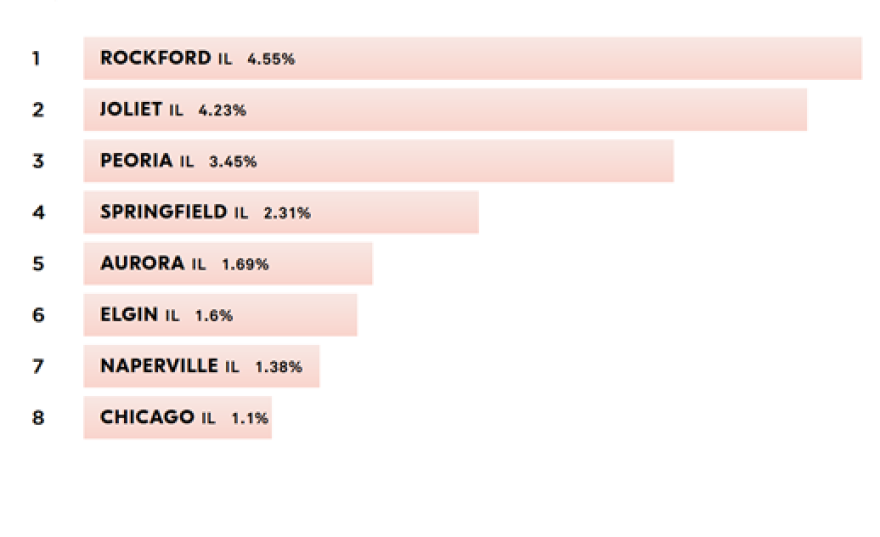The Eviction Lab at Princeton University collects eviction records from across the country. As of 2018, it finds that Rockford has the highest eviction rate in Illinois among the state’s largest cities. That’s over four evictions filed per 100 renter homes.
Some officials dispute those numbers.
Among them is Paul Arena, a Winnebago County Board member and the director of legislative affairs for both the Illinois Rockford Apartment Association and the Illinois Rental Property Owners.
He said officials told him the courts did not provide data for the study. An eviction Lab spokesperson told WNIJ that when public records of evictions weren’t available, they purchased datasets from a third party.
Arena said, from his perspective, the eviction rate in Rockford is not out of pace with other areas.
“That it's just the normal course of events that have occurred, typically,” Arena said, “that people find themselves in difficult circumstances and then end up being evicted.”
The organizations he represents opposed a state bill that would have sealed eviction files when a judge dismissed the case or ruled in favor of a tenant. As WNIJ has reported previously, an eviction filing stays on a person’s record regardless of the outcome of their case.
Arena said the issue that he finds pressing for Rockford is that the majority of the housing stock is in bad shape.
“Rockford has so much housing stock that's in disrepair,” he said, “because the values are too low to support the restoration of those properties.”.
Arena said that in Chicago the rise in property value drives up the rent, but that’s not the case in Rockford. There, he said, property values are so low that property owners are not incentivized to make repairs. He said they won’t make enough of a return on their investment.
“It's impossible without some type of subsidy,” he said, “to come in and take the housing stock that we have and restore it into a condition to make it safe and habitable housing.”
Rockford Mayor Tom McNamara said city inspectors do a good job investigating complaints related to a building’s exterior. Regarding living arrangements, he said they need more folks to speak up.
But he says some people may be hesitant to do so.
“I mean, you may not like your living conditions, and you may want to report on [them],” McNamara said, “but you don't know what the retaliatory -- what kind of blowback you may get.”
And if the city does go so far as to condemn a building, he said that may not always be the best outcome.
“There's also a struggle,” said McNamara, “because it's so difficult to find housing, that if your property is condemned, that you're renting from where do you go?”
Arena said current state policy doesn’t address the problem of old housing stock, especially multi-unit buildings. Instead, he said policies are tailored for Chicago’s housing issues.
“So even though you can, like identify probably in Chicago neighborhoods where there might be a certain need for assistance,” Arena said, “or they have issues with rapidly escalating rents, and there's all this talk about rent control, those are Chicago problems.”
Also, he said, there’s too much focus on building new housing.
“What I think we need to focus on is recovering what we have,” Arena said, “because if you’re just continuing to build new, then the city just becomes larger, or any municipality. It just becomes larger, and it's more difficult to manage.”
The 2023 legislative state budget does not include resources to tackle existing rental housing units that are in disrepair. It does include increases in temporary housing, homeless prevention, and financing for affordable rental projects.
It also provides an increase in funding for home modifications to support seniors and people with disabilities stay in their single-family homes. Rockford also runs a similar program.
In addition, the city launched a financing mechanism that provides loans to local contractors to rehab dilapidated and vacant houses.
The city has also committed tax dollars for luxury and market rate housing in the downtown area. When WNIJ asked the mayor about the city’s focus on luxury homes, he said the city has people of all different incomes.
“We need housing for all of them,” McNamara said. “And so, yes, we're going to meet our residents where they're at.”
According to the U.S. Census, 22 percent of Rockford residents live in poverty, that’s compared to 12 percent statewide.
Regarding building affordable housing, he said construction costs are an obstacle, as well as communities who don’t want affordable housing in their neighborhoods — a sentiment sometimes called NIMBY, for “Not In My Back Yard.”
But the mayor said a public and private partnership with Habitat for Humanity will result in 25 new affordable homes near an undeveloped subdivision close to Auburn High School.



